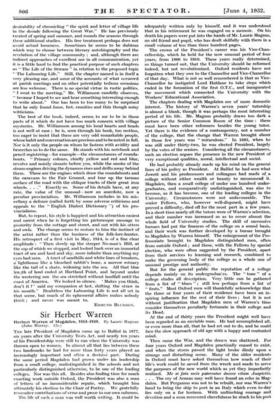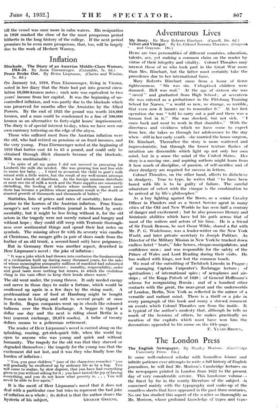Sir Herbert Warren
Herbert Warren of Magdalen, 1853-1930. By Laurie Magnus. (John Murray. 12s.)
THE late President of Magdalen came up to Balliol in 1877, six years after the University Tests Act, and nearly ten years of his Presidentship were still to run when the University was thrown open to women. In almost all that lies between these two landmarks he had for more than forty years played an increasingly important and often a decisive part. During the same period Magdalen had grown under his leadership from a small college, undistinguished in the schools and not particularly distinguished otherwise, to be one of the leading colleges. Nor was this all. Besides also finding time for much exacting work outside Oxford, the President was also a man of letters of no inconsiderable repute, which brought him ultimately his election to the Chair of Poetry. We gratefully remember contributions of verse and prose to our own columns.
The life of such a man was well 'worth writing. It could be adequately written only by himself, and it was understood that in his retirement he was engaged on a memoir. On his death his papers were put into the hands of Mr. Laurie Magnus, an old friend and pupil, who has dealt skilfully with them in a small volume of less than three hundred pages.
The crown of the President's career was his Vice-Chan- cellorship, which he held for the now unusual period of four years, from 1906 to 1910. These years really determined, as things turned out, that the University should be reformed indeed, but not revolutionized. Oxford residents have not forgotten what they owe to the Chancellor and Vice-Chancellor of that day. What is not so well remembered is that as Vice- Chancellor he instigated Lord Haldane to take steps which ended in the formation of the first O.T.C., and inaugurated the movement which connected the University with the Workers' Educational Association.
The chapters dealing with Magdalen are of more domestic interest. The history of Warren's seven years' tutorship is almost a blank, though it was perhaps the most interesting period of his life. Mr. Magnus probably draws too dark a picture of the Senior Common Room of the time : there must have been other reformers besides the young tutor. Yet there is the evidence of a contemporary, not a member of the college, that the change that Warren brought about in those few years was " miraculous." In 1885, when he was still under thirty-two, he was elected President, largely by the votes of the seniors. Considering all the circumstances, such an election argues the presence in the new President of very exceptional qualities, moral, intellectual and social.
He had probably already made up his mind on the general lines of his policy as President. At Balliol he had seen what Jowett and his predecessors and colleagues had made of a college without either wealth or beauty to recommend it. Magdalen, then a small college of under one hundred under- graduates, and comparatively undistinguished, was also to become, as it has become, one of the leading colleges in the University. Circumstances were not unfavourable. The senior Fellows, who, however well-disposed, might have proved a difficulty, died off for the most part in a few years. In a short time nearly all the tutors were of Warren's selection, and their number was increased so as to cover almost the whole field of University studies. The skill of successive bursars had put the finances of the college on a sound basis, and their work was further developed by a bursar brought to Magdalen by Warren himself. The enlargement of the Pro- fessoriate brought to Magdalen distinguished men, often from outside Oxford ; and these, with the Fellows by special election, who were often suggested by the President, apart from their services to learning and research, combined to make the governing body of the college as a whole one of unusual prestige and authority.
But for the general public the reputation of a college depends mainly on its undergraduates. The " tone " of a college eludes all description. Very little can be gathered from a list of " blues " ; still less perhaps from a list of " firsts." Most Oxford men will thankfully acknowledge that the three or four years of their residence have been an in- spiring influence for the rest of their lives ; but it is not without justification that Magdalen men of Warren's time consider themselves peculiarly fortunate in their college and its Head.
At the end of thirty years the President might well have been regarded as an enviable man. He had accomplished all, or even more than all, that he had set out to do, and he could face the slow approach of old age with a happy and contented mind.
Then came the War, and the dream was shattered. For four years Oxford and Magdalen practically ceased to exist, and when the storm passed the light broke dimly upon a strange and disturbing scene. Many of the older residents in Oxford must have asked themselves how much of their life's work could be saved from the wreck and made to serve the purposes of the new world which as yet they imperfectly realized. Me si fate mess pcderentur ducere vitam Auspiciis.
. . The cry of Aeneas may well have found an _echo in Mag- dalen. But Pergamus was not to be rebuilt, nor was Warren's hand to bring the ship to port in an Italy which even to-day lies only on a far horizon. With unflinching courage and devotion and a soon recovered cheerfulness he stuck to his post till the vessel was once more in calm waters. His resignation in 1928 marked the close of far the most prosperous period hitherto in the long history of the college. If the next period promises to be even more prosperous, that, too, will be largely due to the work of Herbert Warren.





































 Previous page
Previous page